What is “Art for Reconstruction”?
The “Art for Reconstruction” project is the decided commitment of Prolongar® Foundation towards reconciliation. Through this model, we have not only connected three populations considered adversaries under war logics –civilians, veterans of the Public Force and people in the process of reintegration– but we have also managed to mobilize citizens with the art exhibit Unlikely Encounters.
In its first phase, the project was developed in Medellin between September 2018 and September 2019, with 54 participants from the three different groups in conflict and more than 600 exhibition visitors. We are currently implementing the second phase of the project that will run until April 2021. In this second phase, we are reaching another group of 60 people in conflict from the Aburrá Valley Metropolitan Area. To scale up “Art for Reconstruction”, we will also transfer the methodology used in the project to institutions at the local, regional and national levels.
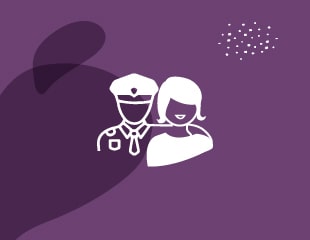
Personal and systemic transformation.

Art and behavioral sciences working together through measurement.
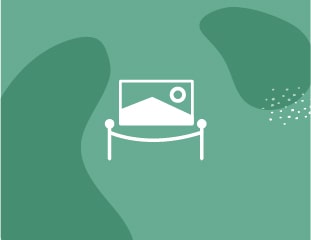
Includes an itinerant museum that extends its impact over time and in different territories.
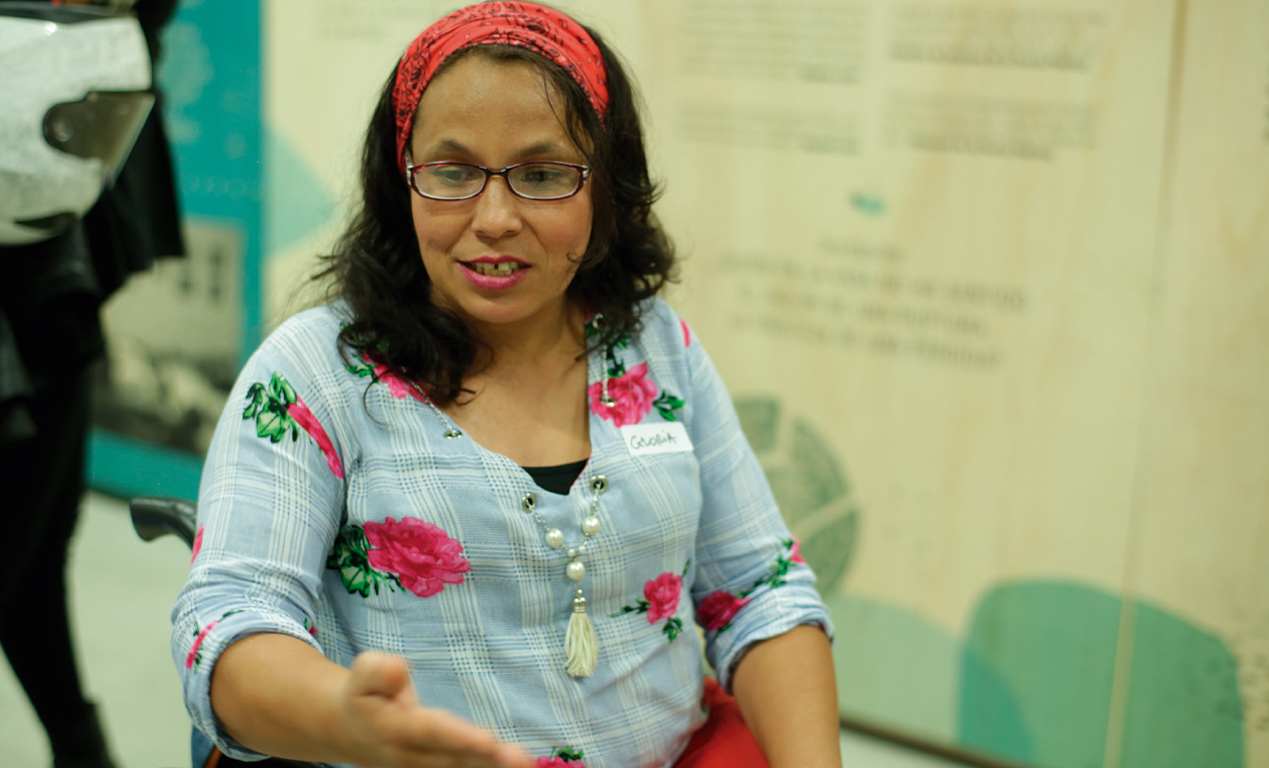
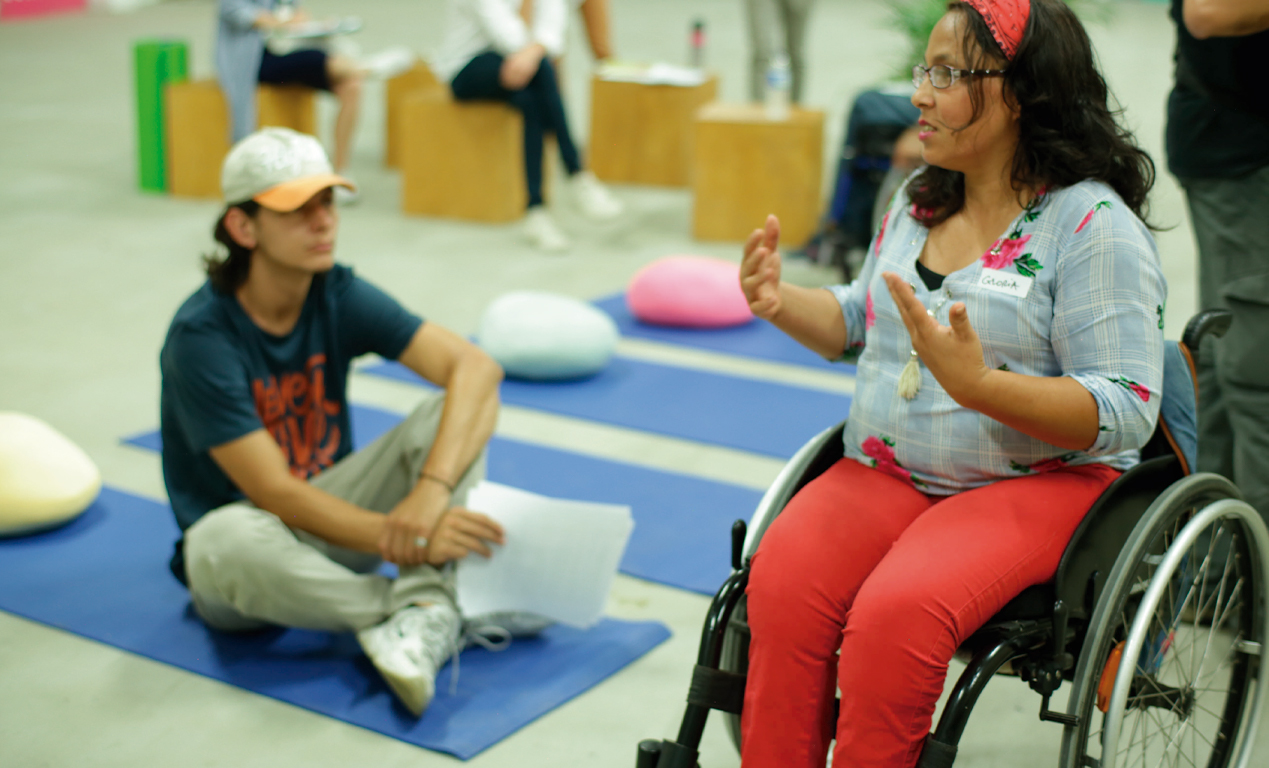
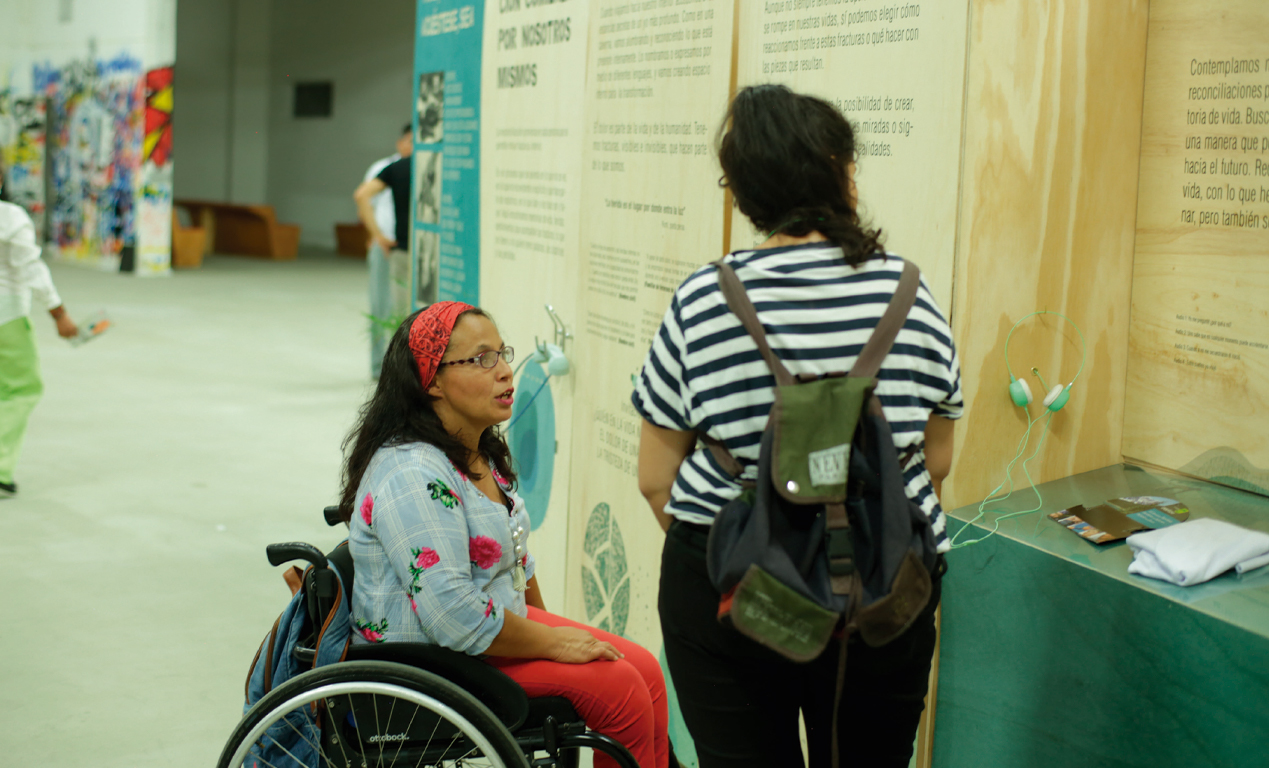
G l o r i a
Written by Julia Serrano
«You can start over», said Gloria, after losing the movement of her legs due to a stray bullet during confrontations between the Public Force and urban militias in the Commune 13 of Medellín.
The Commune 13 of Medellín is famous for having been the scene of recurrent conflicts between urban militias of the guerrillas, Public Force and paramilitaries, in addition to the controversial Operation Orion. At that time, the frequent shootings restrained children from going to school, and there was violence in every corner.
Gloria lived there in 2002. At that same place, while walking through the streets, she was hit by a stray bullet during a confrontation. Days before the event, Gloria began to feel sad, restless, eager to change her life. That day her anxiety was more intense, like a premonitory instinct of something she still cannot understand.
After winning the battle for her life, Gloria had to learn to live without walking, and her children to have a mother in a wheelchair; the whole family had to adapt to the new condition in a context that is not prepared to serve people with disabilities. Suddenly she was forced to develop new skills, learn how to get on and off the chair, use public transportation in another way and take risks competing with cars for a space in the streets. She saw the physical, social, political and psychological barriers faced by people like her; discrimination, stereotypes, the inability to participate in certain activities and the decrease of job opportunities.
There were months of pain and helplessness for her and her family. But, on her birthday, more than a year after the accident, Gloria remembers that when she woke up, she received a visit from three angels. She had the certainty of being accompanied by them in this unknown path. With the help of a spiritual guide, she managed managed to look up and receive the message of a God who would shine through her. By then, she decided to validate high school, study pattern design and she became a community leader.
Through Prolongar workshops, external and internal wounds continued to heal, as well as her relationship with herself and with society. She has retold her story and understood that doing so means supporting other people who have gone through similar situations. This has led her to rediscover herself, to find courage, to be there also for those who need her and to regain the spirit of living. Today she is invaded by the need to go further in reconciliation, to continue forgiving and restoring the hearts of her children, affected by everything that happened.
‘I am a dreamer!’, she concludes when talking about her plans to graduate as a pattern maker and to move to the countryside to set up a workshop at home, and maybe, walk again. That premonitory instinct did not save her from the bullet, but perhaps she sensed that life was going to change her to find a new meaning. It is possible that, deep down, she knew that those scars would later turn into the gold that would make her shine.
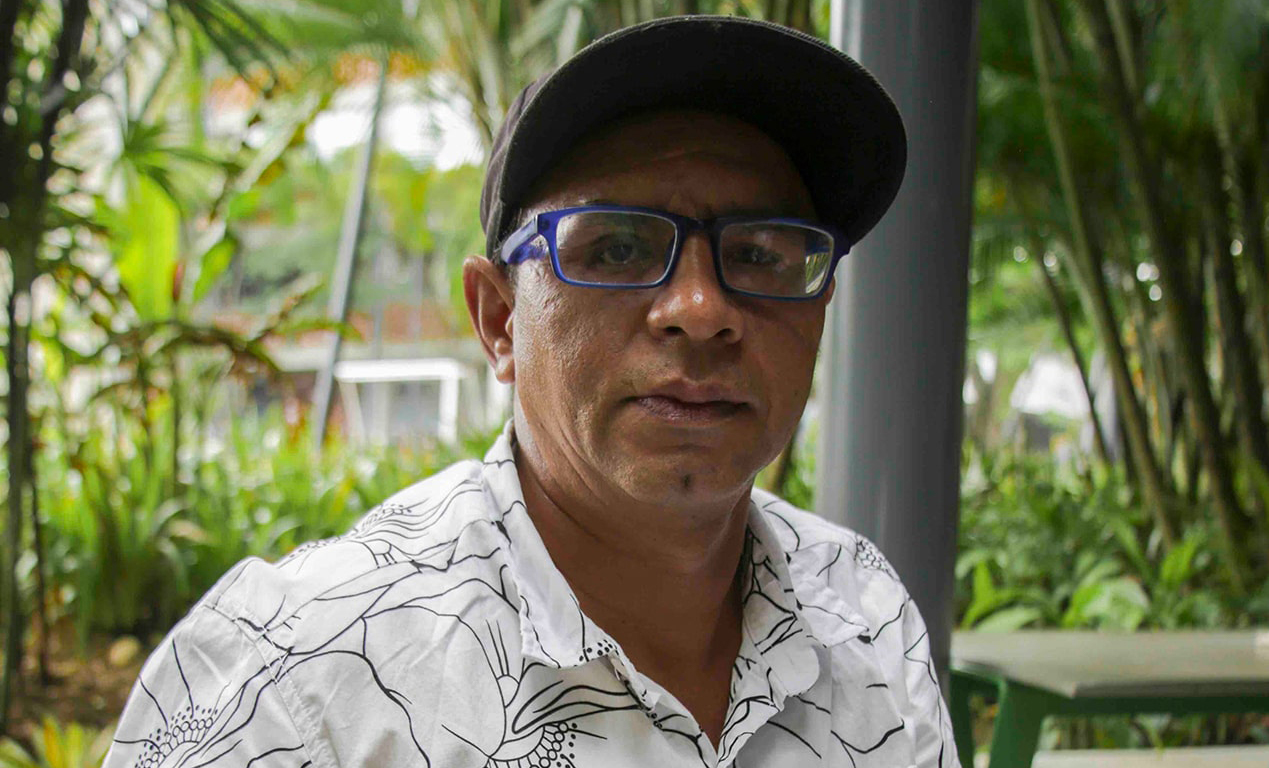
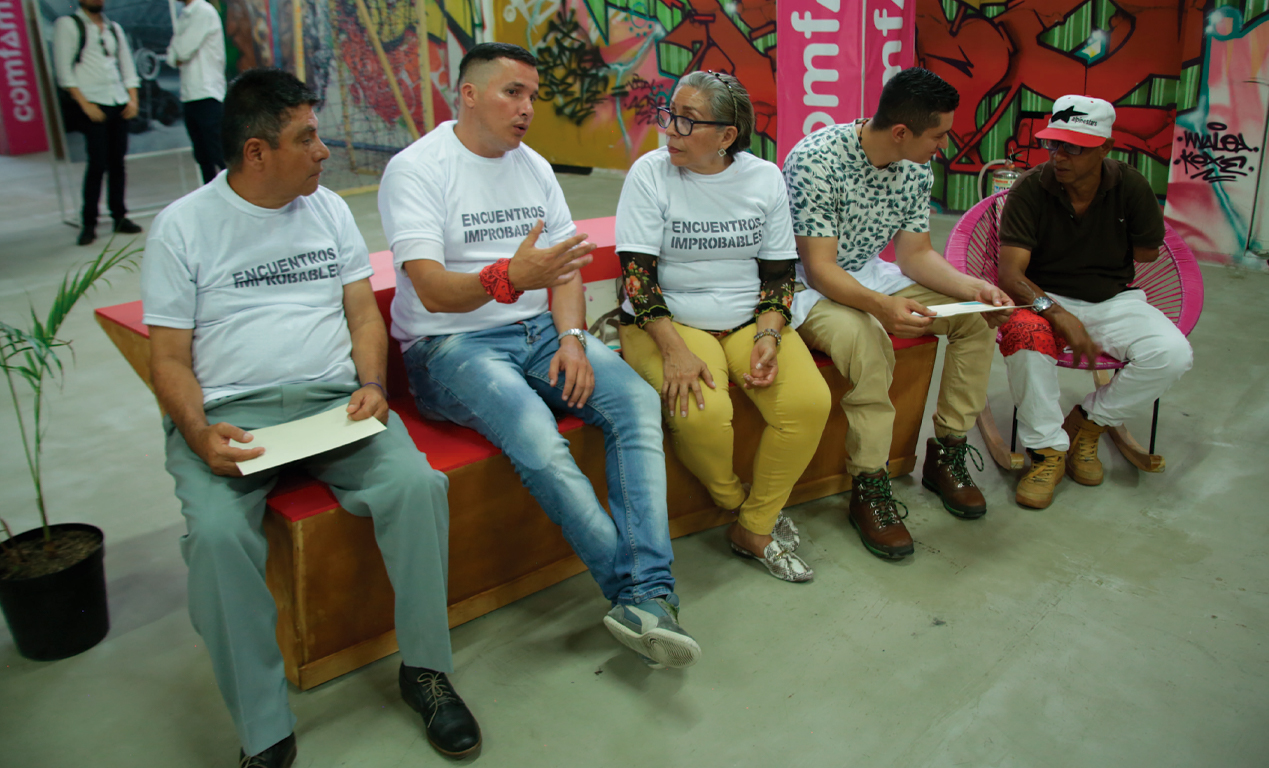
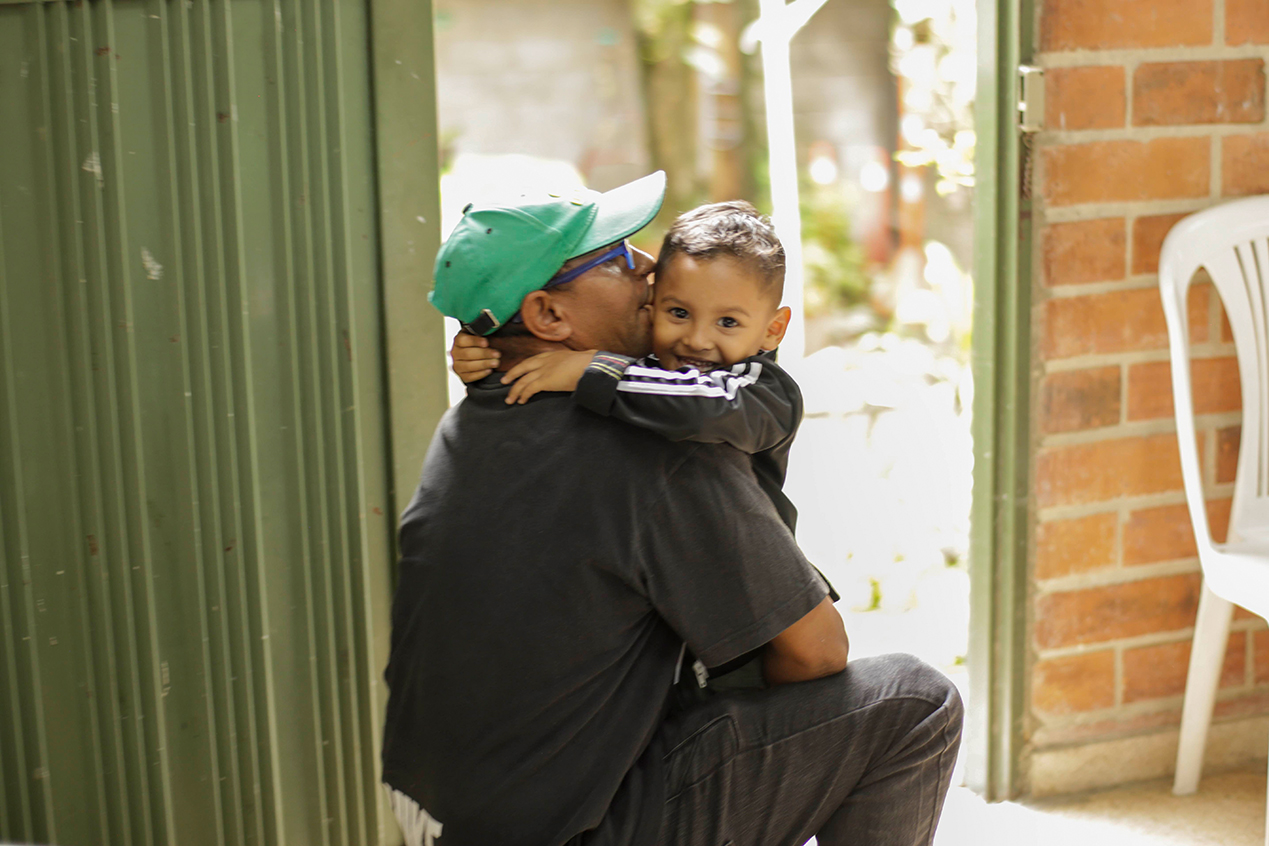
G o y m e r
Written by Julia Serrano
Goymer, a justice seeker whose decisions took him to minefields putting his life and integrity at risk.
Goymer is motivated by a need to demand that his rights and those of less favored people are respected and protected. This impulse has driven his life, but his actions have not always taken him to the best paths, on the contrary, he has ended up in situations that harm him and other people. When he tells his story, Goymer implies that a variety of events in an unfavorable context and the absence of other choices led him to make wrong decisions that ultimately lead to his participation in the paramilitary. The lack of job opportunities, the lack of security, and his own internal conflicts, were enough for him to end up in illegal activities.
When the life of these groups was about to turn around with the Santafé de Ralito agreement, he was hit by a landmine. Despite being the unfortunate victim of this late attack, he thanks God for being alive, in addition to being saved from another death threat when he was accused of being a traitor while he was in the hospital.
After demobilization, he worked as a community leader requesting for better transport conditions for people with disabilities and refusing to support the installation of tolls on the roads of his region. Due to the protests, Goymer was threatened and had to flee unexpectedly from Urabá leaving everything behind to go to Medellín and start from scratch once again.
Today he lives with his three children and his grandson. Gardening is what he likes the most and he is making an effort to find a way for himself to flourish in civil life despite his disability. He is trying to get a good job that allows him to improve his economic situation, support himself and his family; but every day he must face the obstacle of not being accepted by an injured society that hardly understands the complexity of individual and collective responsibilities taking into account the chains of command of armed structures. What is certain is that the personal story of their members is rarely known, and, usually, few people want to know about it; often, not even their own relatives.
Thanks to his participation in Prolongar workshops, Goymer has managed to focus on good things, keep negative thoughts away and even start reading again. It has been another step to understand and take responsibility for his decisions and thus continue his spiritual growth. The practice of Kintsugi helped him identify his inner strength, to accept his external scars that are so obvious and the internal ones that are still healing.
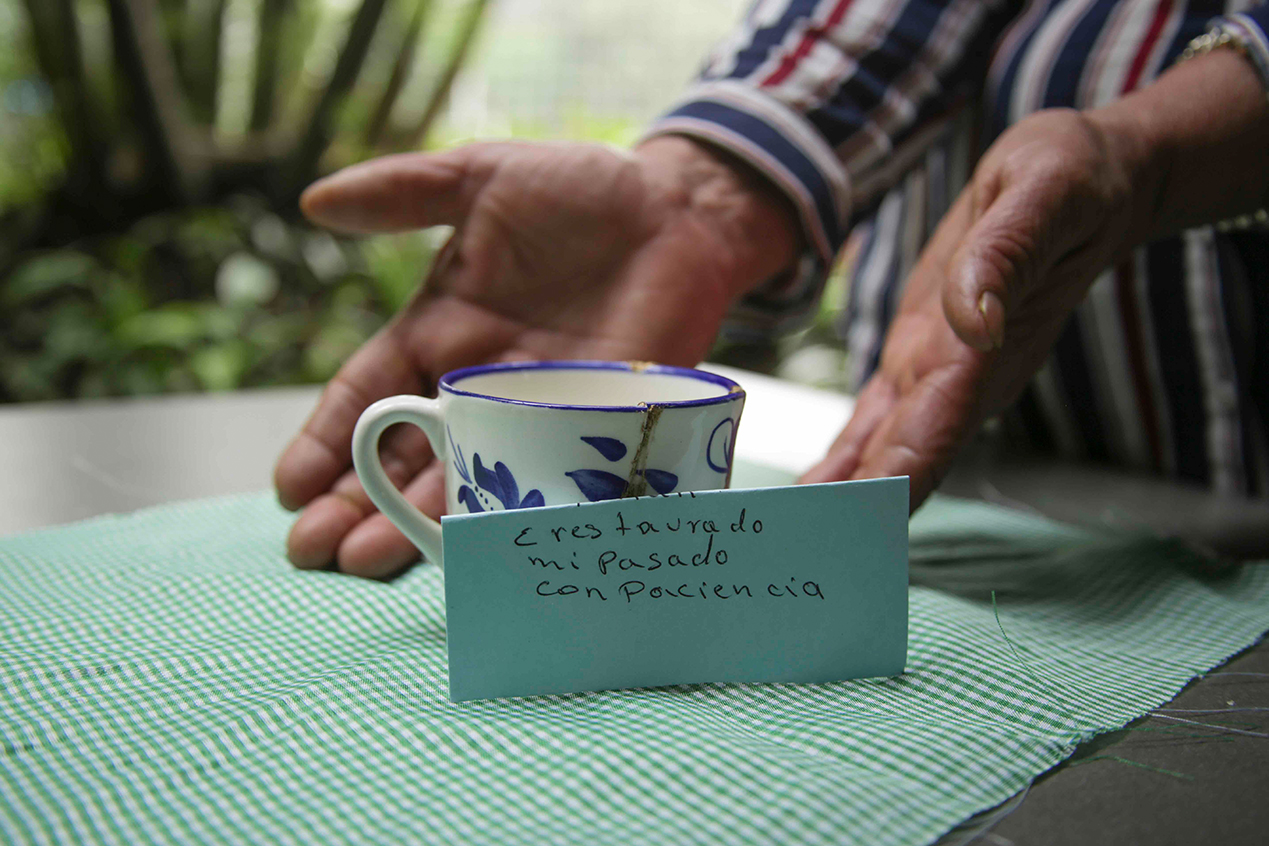
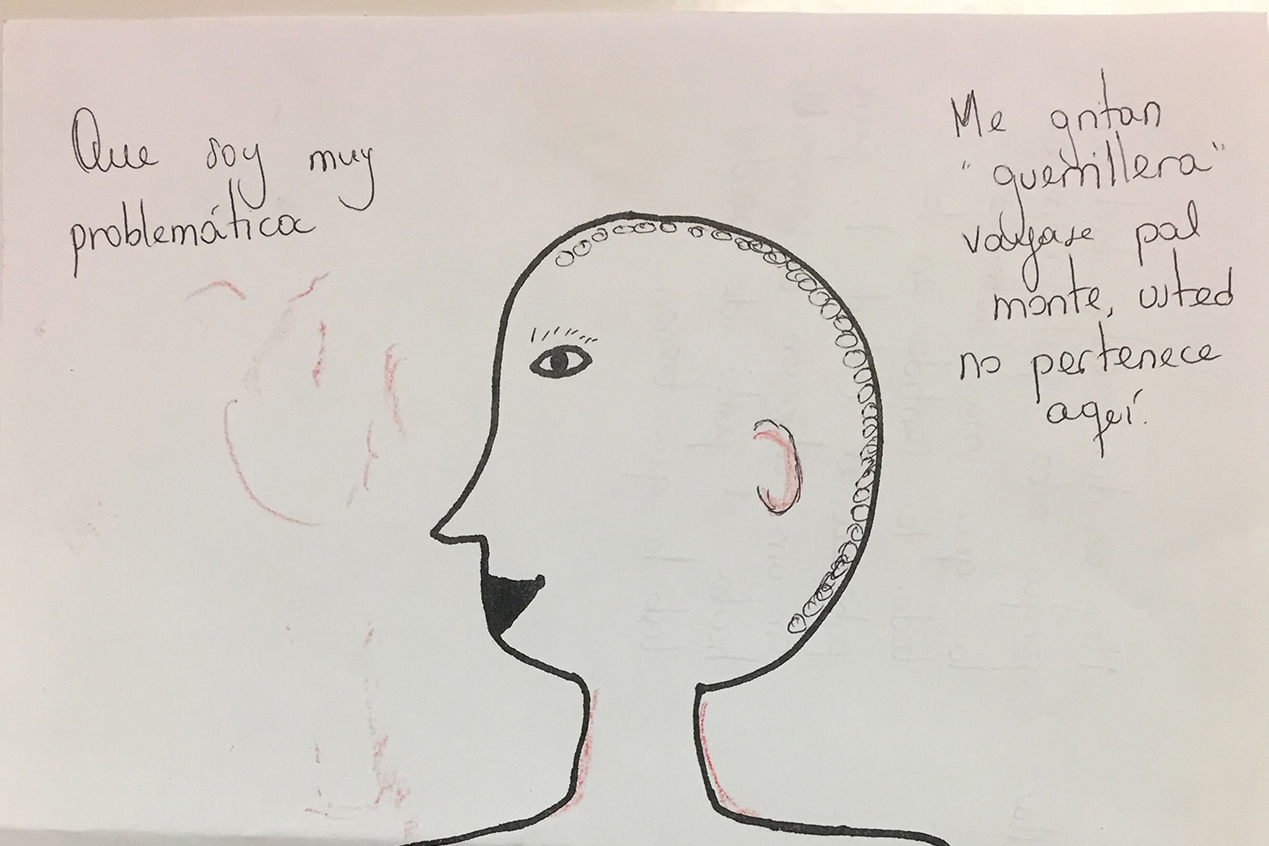
C l a u d i a ( A n o n y m o u s )
Written by Julia Serrano
The challenge of having a «normal» life within the law for a woman who was recruited at age seven.
Claudia does not want to disclose her real name or her story, because despite being within the framework of the law, putting down the weapons and having a strong commitment to building a new life, she continues to feel threatened and judged by her past as a guerrilla fighter. A past she did not even choose because she was recruited by the guerrillas in Antioquia to join the revolutionary army, when she was about 7 years old.
Claudia represents a reality that thousands of young people live in Colombia. With a history of more than 5 decades of war, we have one of the highest rates of child recruitment: from 1960 to 2016, 16,879 cases were registered.*
Why children and adolescents? What do they have to do with war? On the one hand, there is the socio-economic and family context in which these young people live, generally in poverty, without access to a good education and exposed to situations of vulnerability and violence in which there are no conditions to protect them. And on the other hand, armed groups outside the law appear, seeking at all costs to strengthen their armies, taking advantage of this scenario to recruit and sow their ideology in innocent minds willing to learn and absorb everything from the world around them. Many young people like Claudia end up being forcibly recruited to be part of a universe in which almost all of their rights are violated, where they are constantly exposed to situations that generate effects which are very difficult to reverse.
Then, in the process of reintegration into civilian life, there are the challenges of living a life that they have already forgotten or they have never known. It is difficult to find a place in which they can be seen beyond their past. Despite being prepared to leave their weapons, society has not been prepared to receive demobilized people. These are individual and collective wounds that take time to heal, so it is necessary that the country also commits to give people in the process of reintegration a chance, so that something beautiful can emerge from the broken pieces of their history that is also ours.
Despite a tragic destiny, today Claudia is a compassionate person who has decided to rebuild her life as a citizen, working honestly, living with her children and grandchildren and helping less favored people whenever she can. In the workshops of Prolongar Foundation, she found that place in which she could feel appreciated, where she also managed to tell a story that not even her family wanted to hear. In this way she has been able to clean her inner space to draw on it a new personal universe.
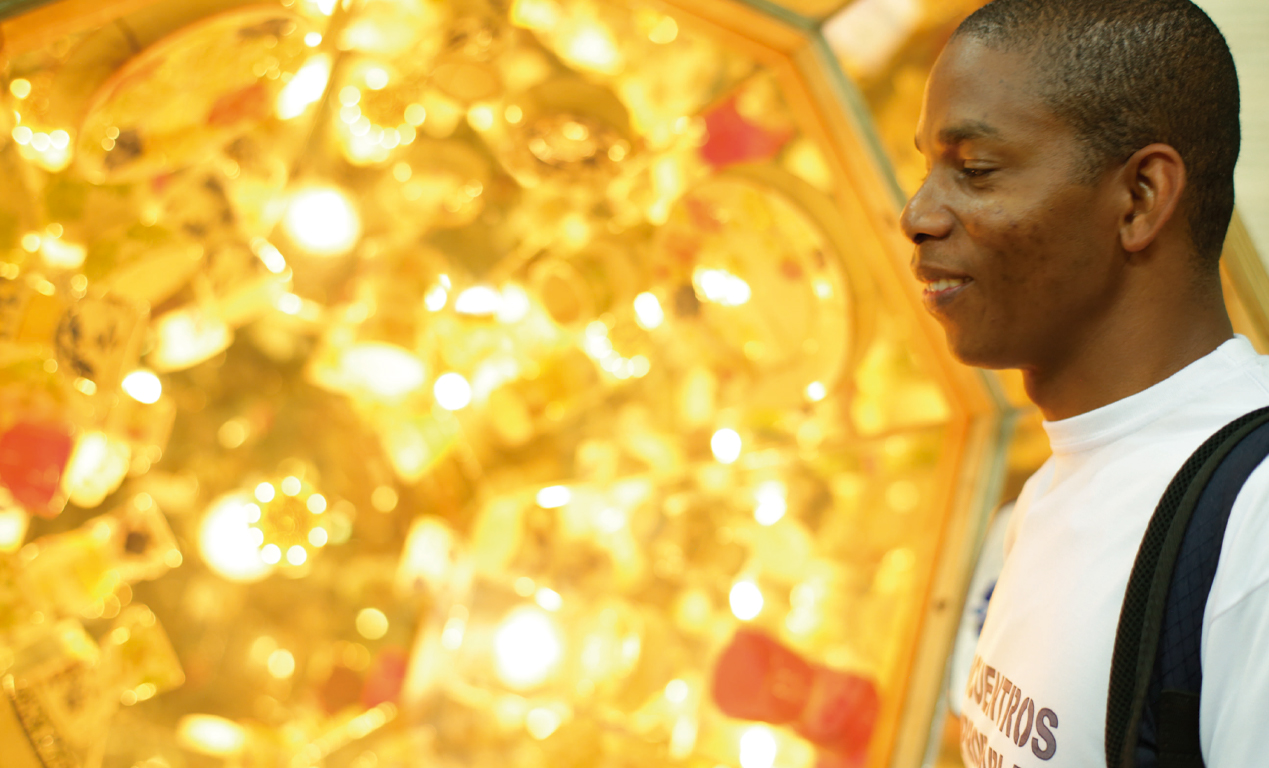
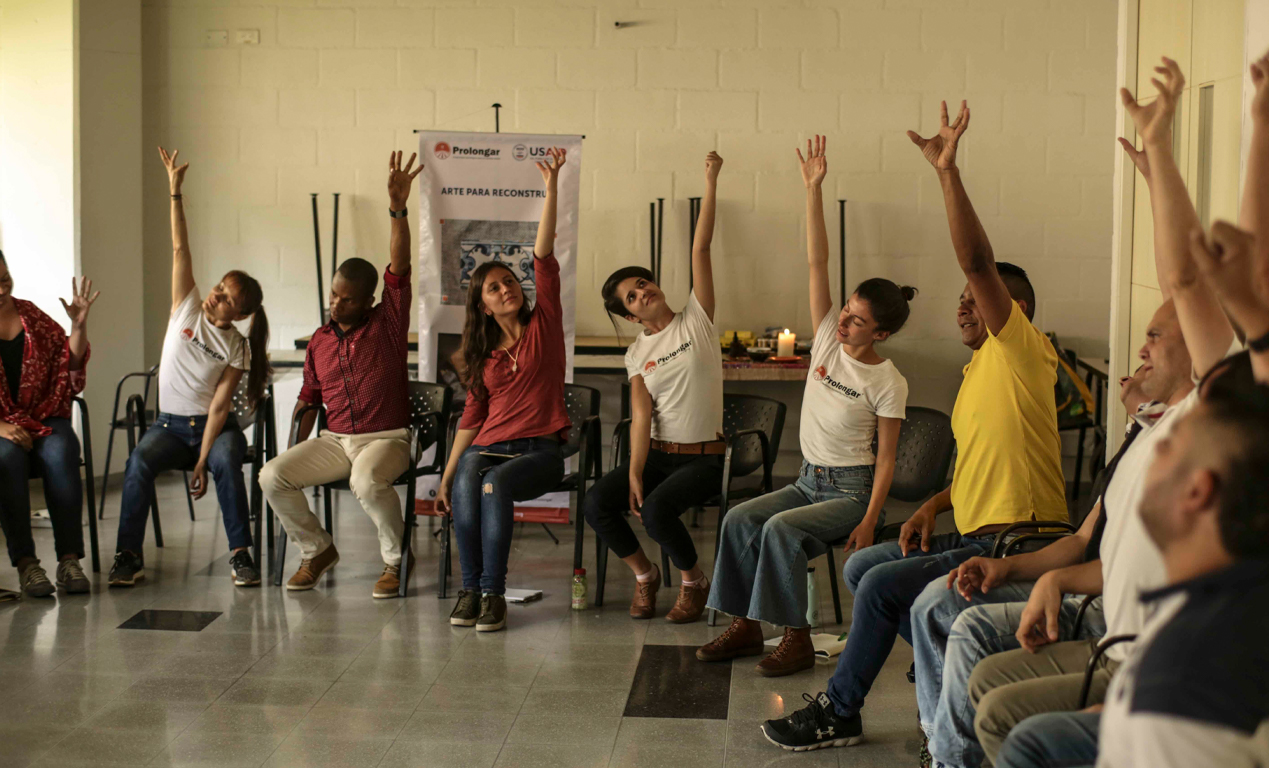
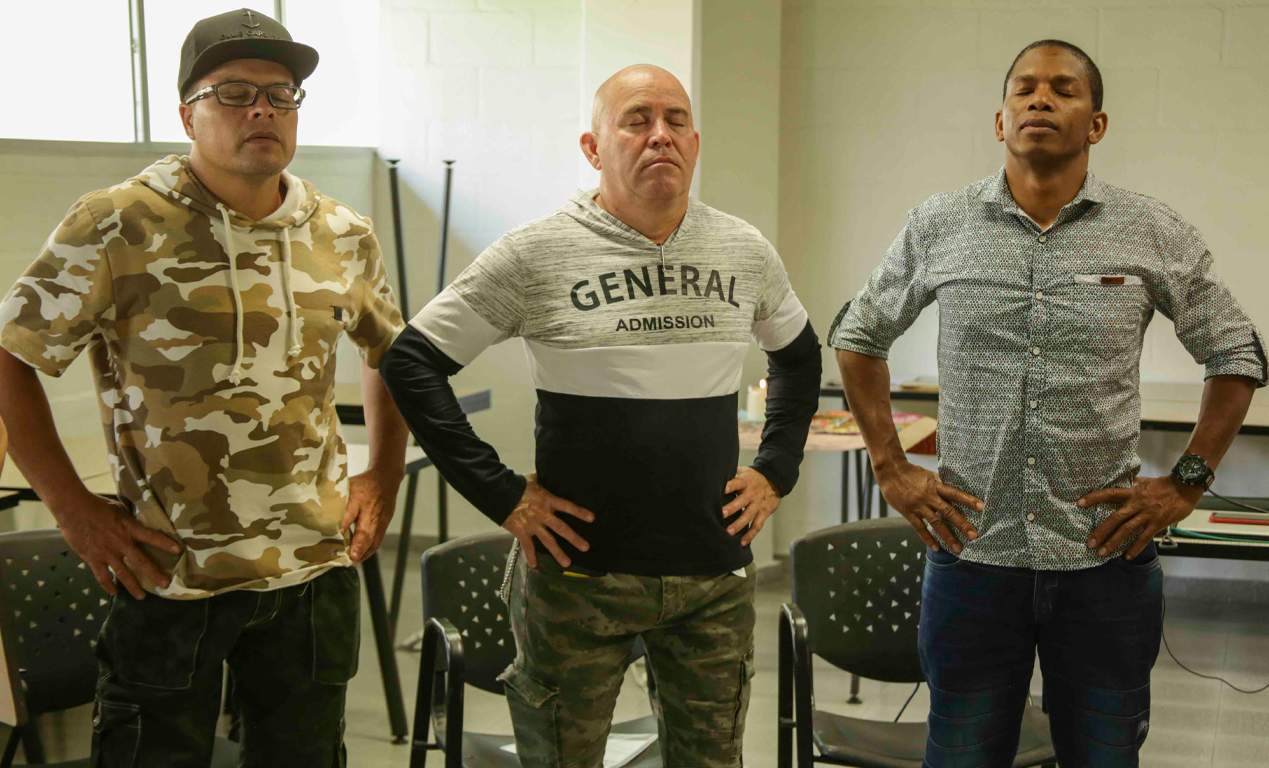
J a i r
Written by Julia Serrano
Start over, reinvent yourself to readapt to the world in freedom after suffering the trauma of kidnapping.
‘Captivity is very difficult, you don’t see your family, you get sick in the jungle. It is a trauma, you are tied, handcuffed, there is no privacy,’ says Jair, who for three years had to cling to his faith and the desire to be with his children, to meet the second-born during his captivity. To pass through the martyrdom of kidnapping, a part of the body, mind and spirit ends up adapting. Jair says that we, as humans, live through habits; we get used to war, to the deprivation of liberty, to mistreatment, to loneliness, to fear, to precarious conditions of food and health, to the jungle and its humidity, its insects, its sounds, its walks, and to the hardness of the floor that receives you every night. The problem is that when you get used to all of this, returning to live in freedom can be as traumatic as the kidnapping itself.
Posttraumatic stress is a condition of psychosocial disability that is very difficult to overcome, even with long and frequent treatment sessions. «The symptoms can be intrusive memories, evasion, negative mood changes and negative changes in thinking, and in emotional and physical reactions.”* A lot of time is needed to dissolve the memories and survival behaviors learned during captivity, to get rid of that defensive, alert and fearful state.
After 17 years, Jair has gotten used to his nightmares with his nightmares, because he can’t control them, but he has consciously decided to choose a path of self-knowledge and personal growth that gives him peace and happiness. Today he never gets tired of thanking God for being alive and free, for keeping him safe in many situations “to fulfill some purpose». In the journey towards his own healing, Prolongar Foundation has been very important thanks to the psychological and emotional support received in «Art for Reconstruction». He also learned a lot from each participant and their values; he realized that he is not the only one who has suffered the consequences of war. ‘When I am in the workshops I feel that I am in the place I should be, that God chose me to be here’.
Jair wishes that this learning can reach other colleagues who have suffered the same so that they can heal the symptoms of post-traumatic stress and live in peace. the mission that keeps him alive might be to carry the message of forgiveness to others affected by the armed conflict, who, despite being free, have not been able to release themselves from the chains of resentment, pain and fear. ‘To make mistakes is human,’ says Jair, ‘we all make mistakes and we must all be forgiven. Hate and resentment only hurt myself.’
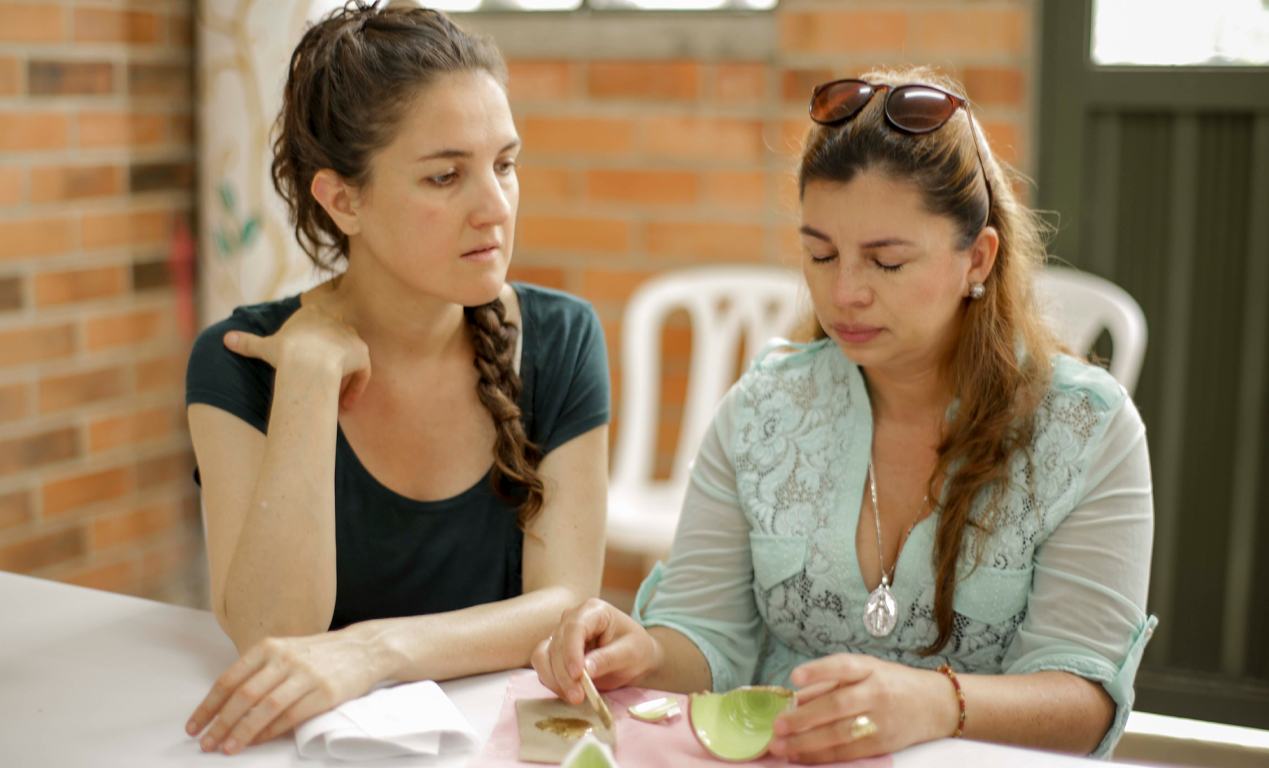
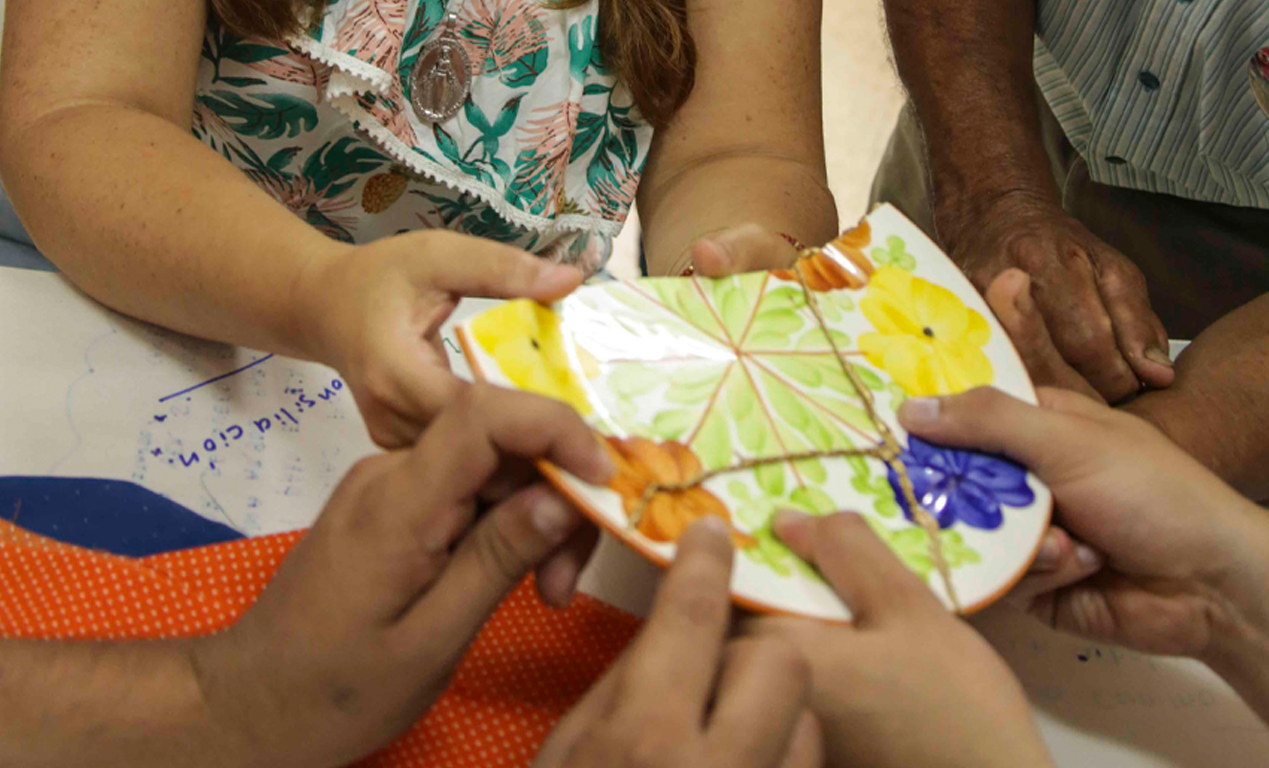
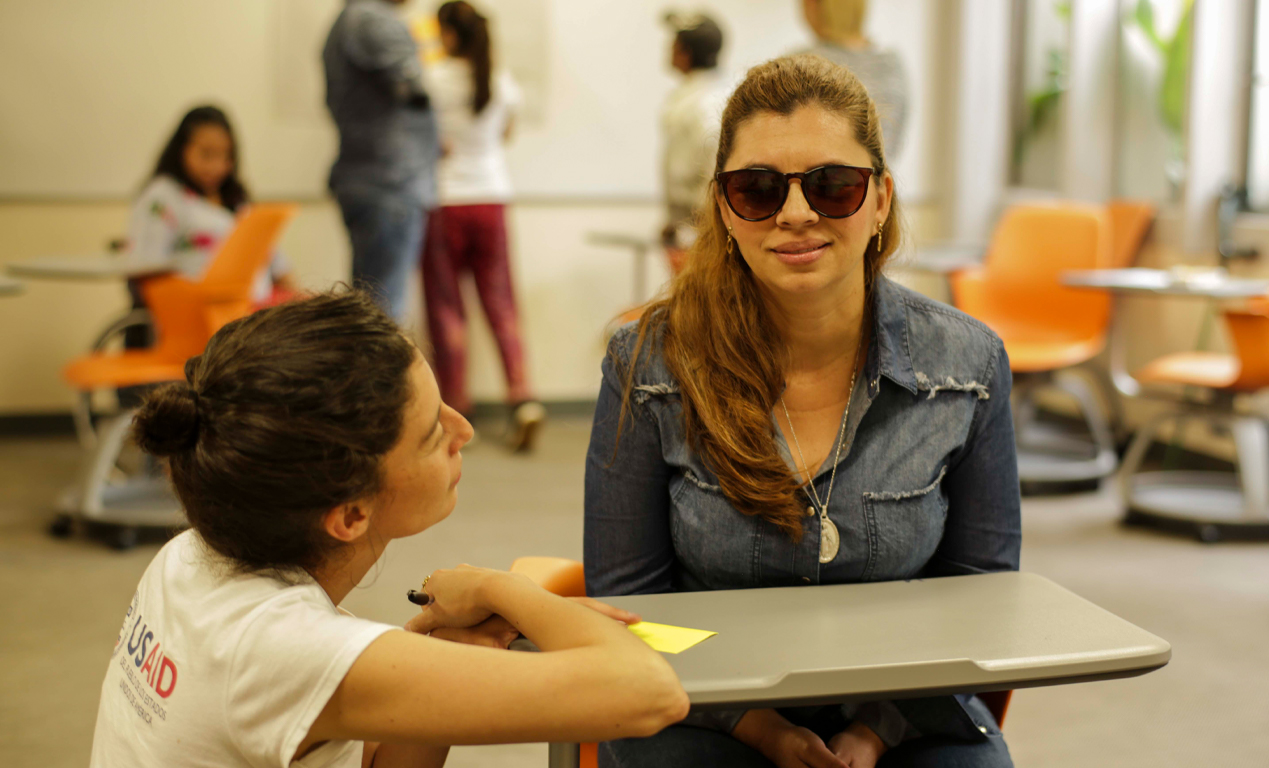
L u c e i r a
Written by Julia Serrano
Through Luceira’s life, we understand the infinite consequences of a conflict that does not know how to end and the innocence that is necessary to continue living without being a part of it..
Despite the violence, loneliness and pain in her life, Luceira is sustained by solid roots that bring her the peace and acceptance necessary to face the harsh reality she is exposed to. From an early age, she was subject to unthinkable things such as the murder of her mother, the abuse of her brother, the forced displacement by the armed conflict, and constant experiences of sexual harassment and abuse. As if it wasn’t enough, then she lost her sight as well as the support and affection of her family. Then comes the challenge of learning how to move in the city without seeing, without knowing where you are or what is happening around you. A destination crossed by a series of unfortunate events that show us what it is like to live in a context where tragedy is part of the life of the population, and although the things that happen exceed any fiction novel, over time they begin to become routine.
Luceira has had to go through very challenging moments, but losing her sight has been one of the hardest. It took her a few years to regain courage and a few more to learn to be independent with this condition. Nowadays she does everything alone, like going outside, going to the doctor, attending different activities, cleaning up the house, and even cooking. Thanks to the Arcángeles Foundation’s program, she was able to extend her branches by interacting with other people with disabilities. There she found a support network, played sports and even won athletics medals. Today, Luceira continues to live with her husband and two daughters in Medellin. She has always wanted to be financially independent and that’s why she dreams of going back to work, but she frequently faces obstacles due to her visual impairment.
She was contacted through a friend to participate in Prolongar workshops. For her, this opportunity meant finding a place where tenderness and humanity welcomed her, therefore «she didn’t want to leave.» Luceira feels that the «Art for Reconstruction» project was the place where she received love, affection and care. Through the meetings she could experience forgiveness and peace, and learned to face conflicts from another place, by breathing and observing. She also had the opportunity to share about herself and her story with many people, nurturing with her presence that forest in which each one is a necessary piece for something bigger.
What kind of person should you be, to remain standing and to do it with an open heart, serene expression and willing to share your story from a place of innocence and honesty? Luceira is like a tree whose essence remains intact despite seasonal changes, storms, external threats, ready to receive a bird or the comforting heat of the sun.
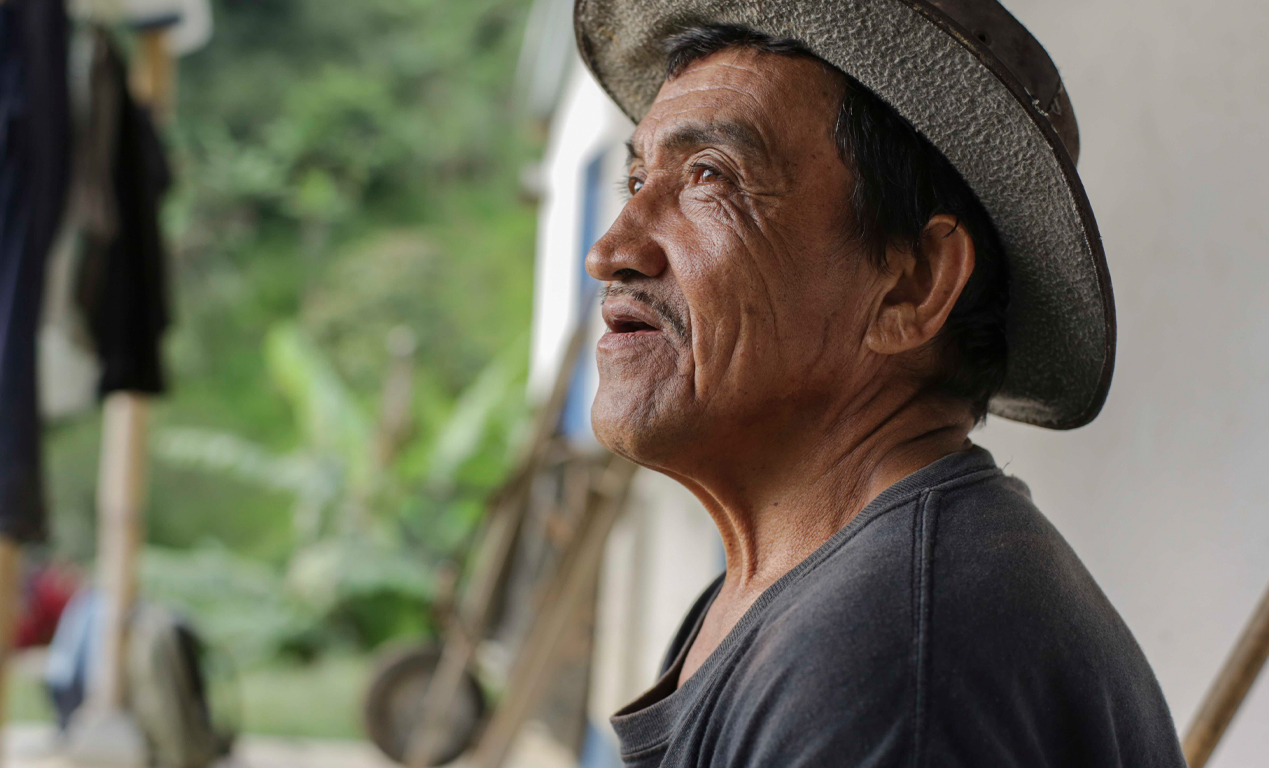
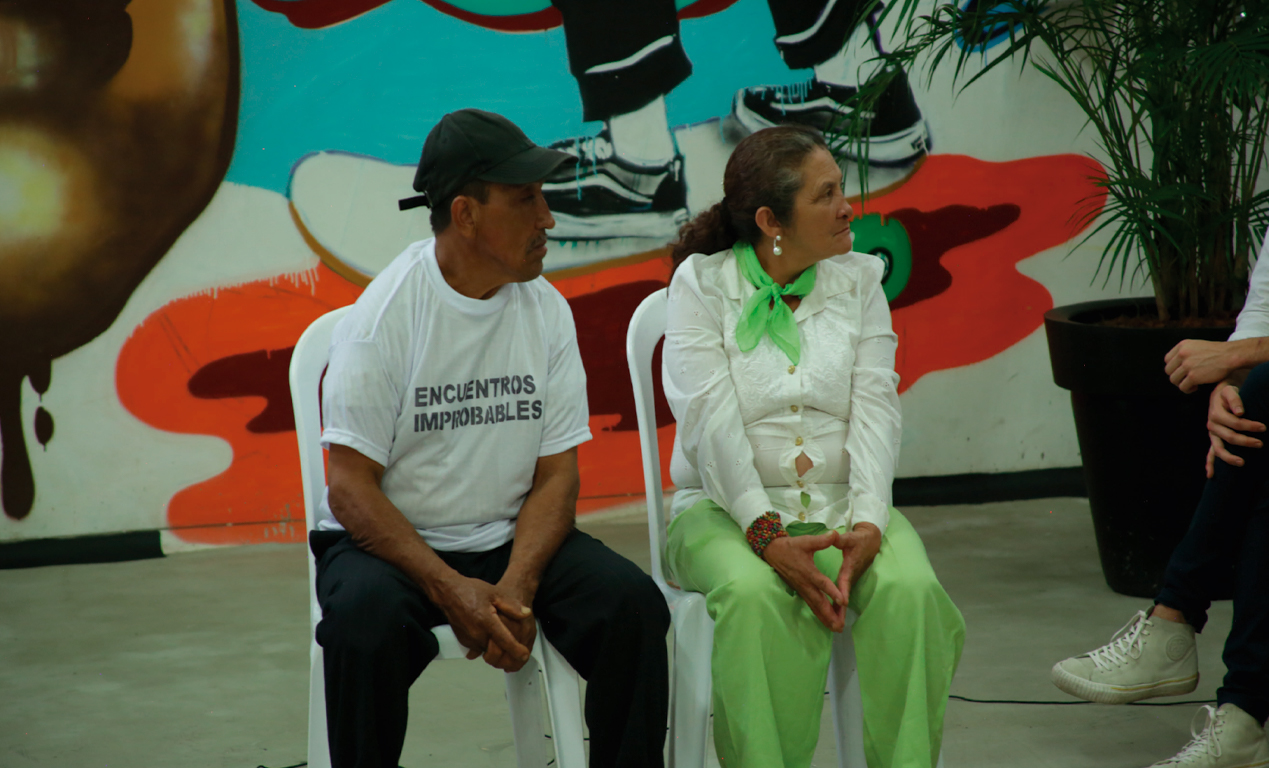
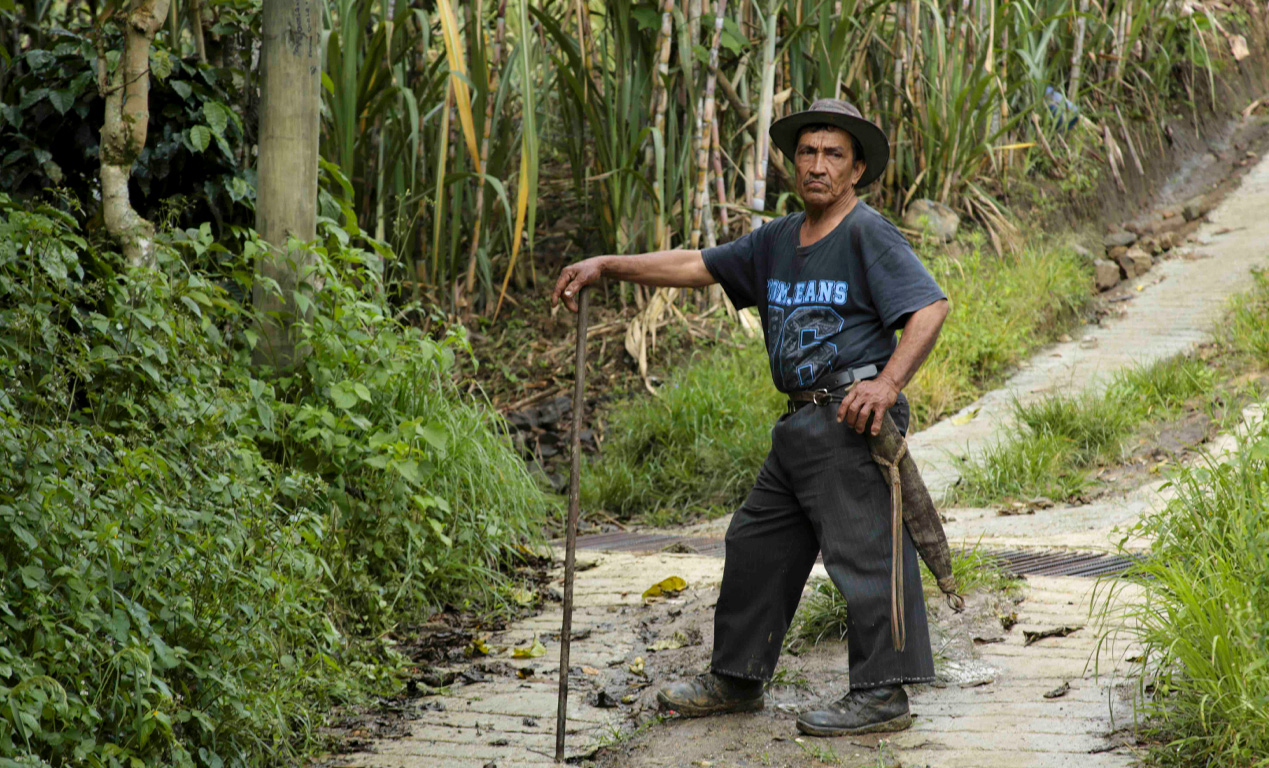
L u i s
Written by Julia Serrano
Luis is one of the many peasants affected by landmines, who are the most frequent innocent victims of the war between the different armed actors.
The story of Luis begins like the story of many peasants in Colombia work the land. From a young age his father taught him and his brothers to know the countryside and to benefit from it. Sometimes they were visited by guerrilla groups that told them het were fit to join the movement. But they didn’t even know what movement these men were talking about, they just saw them arrive soaked from head to toe, constantly talking on the phone. That was not an attractive option for them and they were satisfied with agriculture and their life in the countryside.
But a day like any other, Luis’ life changed because of that movement he knew nothing about in his youth. The armed conflict leaves hundreds of civilians injured every year and landmines are one of the main causes. Between 1990 and 2017, a total of 11,769 people were injured, of which 4,618 being civilians*. Luis says that in those days when he lost his leg due to the explosion, he learned of another three or four peasants that were victims of these landmine attacks; even farm animals were also victims. They lived in a very high risk area, but they didn’t even know it, they had to find out through the tragedy of their own experience.
The prosthesis allows him to perform most of his daily activities, although sometimes it hurts, and it becomes swollen and intense pain forces him to stop for a moment to massage the leg or in the worst case, to stay at home and work on his knees. However, Luis talks about what happened to him as just another thing that happens in life; and with the grace of his smile and inner strength he faces a tragic situation without feelings of anger, without resentment. Perhaps it is the earth and its cycles that teach this resilience and gives the strength to face changes no matter how painful they are.
In the workshops with Prolongar he had the opportunity to listen to other people’s stories, share his own, make friends and recognize through the practice of Kintsugi the strength that helped him repair his walk after the attack. He feels gratitude for being alive and joy for the demobilized guerrilla soldiers who changed to have a better life.
Even though in the last decade landmines in Colombian territory have decreased, as well as their victims, it is estimated that in 2018 there were still approximately 46 million contaminated square meters, according to Landmine Monitor reports**. Most of this landmines are located in territories were peasants work and live, causing their simplicity and innocence to be undermined by a conflict that has nothing to do with them.
*source: http://www.accioncontraminas.gov.co/Paginas/AICMA.aspx
**source: http://www.the-monitor.org/en-gb/reports/2019/colombia/mine-action.aspx
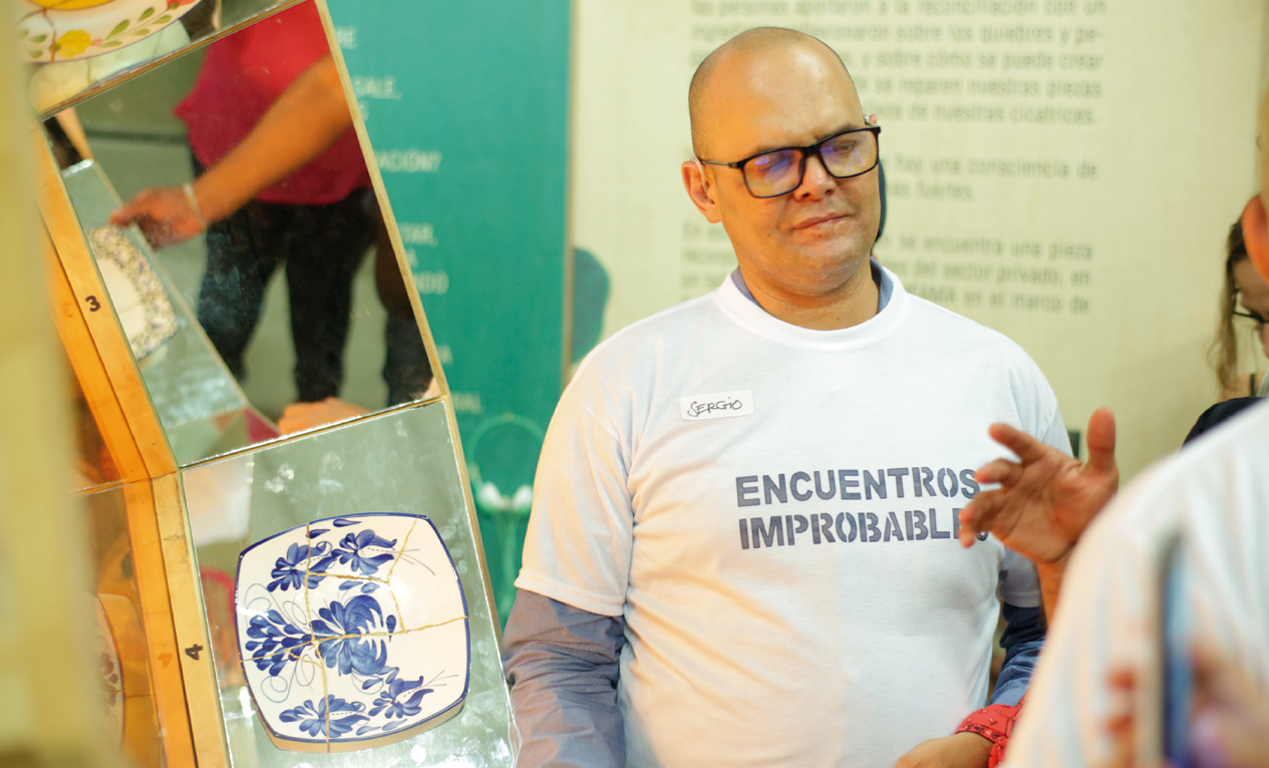
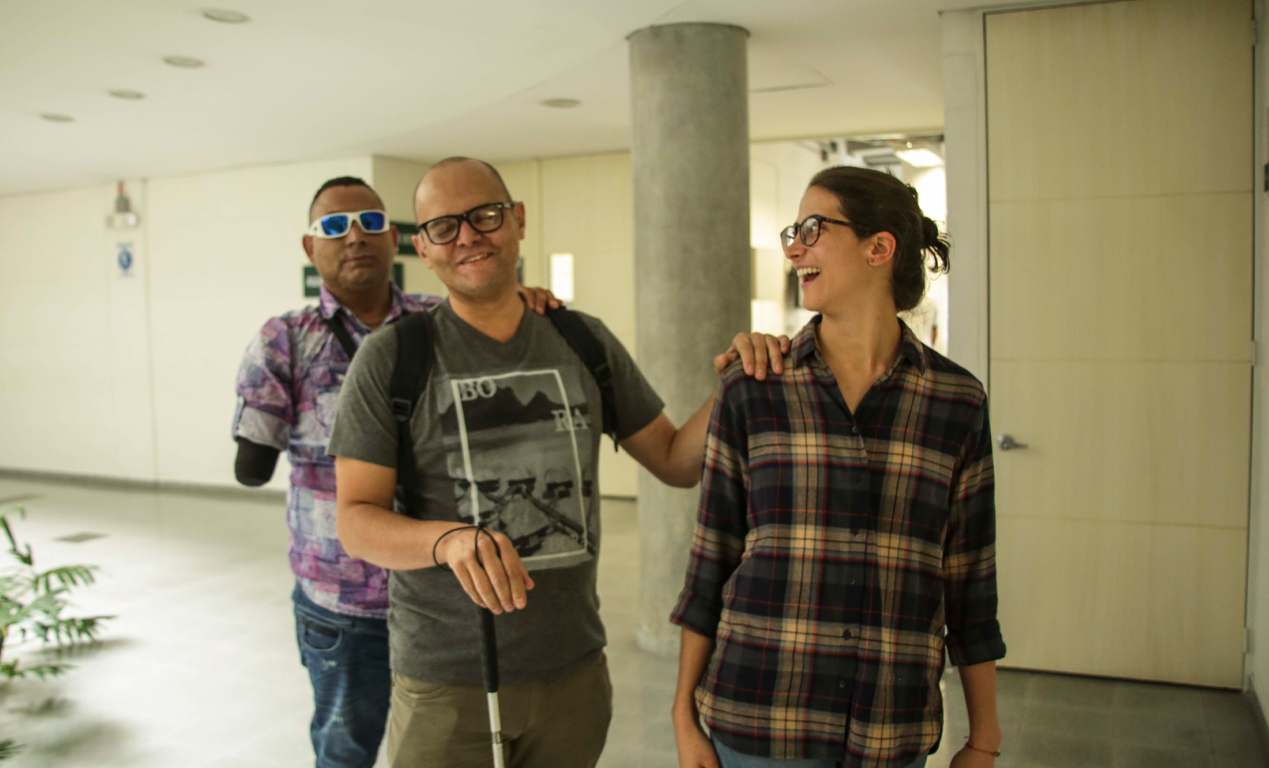
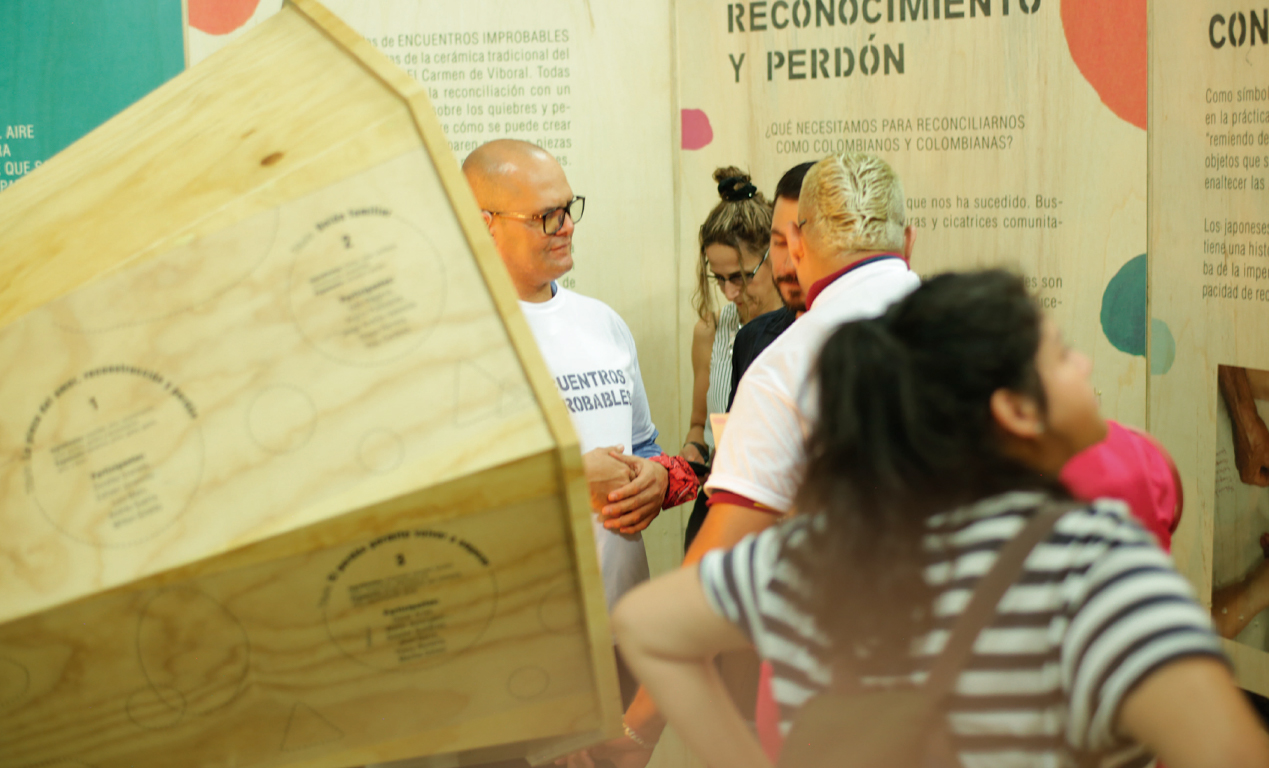
S e r g i o
Written by Julia Serrano
Sergio shows us through his life that although it is difficult, it is never impossible to create something wonderful from the challenges that must be faced.
Thanks to an insatiable thirst to learn, Sergio could fill an entire wall with diplomas he acquired as a policeman, before the attack that left him almost blind, and after his recovery, while living with his new condition. The need to improve himself has only increased over time. He acknowledges that is natural for us to be affected by situations and to feel emotions that fluctuate between sadness, depression, and happiness, but we must always move on.
In his early years as a policeman, he entered the counter-guerrilla and had to face strong challenges such as combats, demobilization, coca crop eradication, and landmines. He never imagined that after making the transition to community police in urban areas, he was going to become the victim of an explosion activated by remote control by the guerrillas. Thus he lost his sight; but according to him, thanks to God, he gained the possibility to see life in a different way, to value more important things like family, a dialogue with a different person or a word of encouragement.
Sergio chose to study as a path, because «studying is a way of life, it is a refuge from problems.» Although some institutions closed their doors due to his disability, along the way he has always found people who believe in him and support him. Just as he set himself to, he graduated from Law, begin Political Science and finish a certification course in Conciliation. He doesn’t get caught up in memories or resentments. Besides, the integrity and love that have ruled his life have given him a calm conscience, as well as the love and support of many people in every place he has lived.
Sergio’s story has been full of challenges, but listening to the way he talks about it, makes us feel that things are simple, because whatever happens, it is up to oneself to recognize an opportunity to grow in every obstacle. That’s what he wants: to keep growing, and to keep learning. And it is certain that with his example he will continue touching other people’s hearts.
When he was invited to Prolongar workshops, his expectations weren’t very high, due to past experiences. However, Sergio tells us that, through this opportunity, he learned to recognize many things he had not seen in himself, such as overcoming pain. Above all, he learned to improve his perspective on life, reconciling with himself and listening to others who have experienced similar or worse situations. He found tools to manage, express and feel emotions, and to help his family, who has also suffered from internal scars. During an exercise with clay, he realized that “life can be molded like clay”. Sergio, like a craftsman, has truly redesigned his life, using the materials he was given to create the best possible piece of art.
The exhibition Unlikely Encounters is a commitment to reconciliation. Going beyond discourses and theories, we created a space between populations considered adversaries under war logics: civilians, retired veterans from the Army and the Police, and people in the process of reintegration who belonged to guerrilla and paramilitary groups. The protagonists were people with visible or invisible disabilities because of the armed conflict, who suffered the victimizing events directly or indirectly.
Standing from the certainty that change is possible in human beings, we begin to wonder about the relationship between transformation and reconciliation: Who transforms?
How is that transformation possible? From there, the encounters that were previously unlikely began to be possible. Through this exploration, we reach a 3-stage process in which today, you will be the protagonist and spectator.
Alirio Montes
Ana Tulia Orozco Gutiérrez
Anderson Montoya Echavarría
Andrés Felipe Echeverry Roldan
Andrés Felipe Guerra Bedoya
Angélica María Mejía Gallego
Argiro Piedrahita
Carlos Alberto Calle Zapata
Darly Hinestrosa Perea
Diego Herrera Días
Doney Asmed Álvarez Holguín
Doralba Granada Vélez
Doris de Jesús Puerta Rincón
Duberney Dávila Hernández
Elver Becerra Ramírez
Elvia Nora Gutiérrez Torres
Eulises Londoño Cardona
Gloria Amparo Urrego
Goymer Gutiérrez González
Gustavo Marín
Iván Rentería Pérez
Jaime Humberto Ortiz Castro
Jair Mosquera Lozano
Johan Alexis Montoya
John Fernando Garro Cartagena
Jorge Andrés Valencia Martínez
Jorge Luis Sequeda Mejía
José Joaquín García Guerrero
José Wilson Díaz Buitrago
Liliana Roldan
Lina Fiscal Cardona
Luceira García
Luis Eduardo Mazo Zapata
Mario Goéz Alcaraz
Martha Gómez Patiño
Martha Lucía García
Milena Zabala García
Milton César Giraldo Castro
Nelson Ferley López Londoño
Nirian Urango Pérez
Oscar Dario Arias Álvarez
Óscar Gutiérrez
Peter Johny Casas Grisales
Sandra Hena Vargas Zapata
Sergio Arango Guerra
Walter Alberto Betancur Zapata
Yerlin Estiven Jaramillo García
Yuly Miledys Cardona Gómez
Yussi Yulieth Rentería
Adriana Cepeda
Audiovisual director and producer
Ana María Tamayo
Local assistant
Andrés Casas
Monitoring and evaluation consultant
Angélica Nieto
Content consultant and workshop facilitator
Carolina Aristizábal
Evaluation volunteer
Catalina Santamaria
Assistant coordinator of project KAS
David Santiago Vallejo
Photography director and cameraman
Federico Mejía
Assistant, photographer and content consultant
José Roberto Jaramillo
Sound technician
Jorge Rodriguez
Museography production Julia Serrano Life story writer Juan Sebastián Díaz Field production Julieta Florez Graphic Designer Manuela Ramirez Evaluation volunteer María Elisa Pinto Project coordinator, workshop facilitator and content consultant María Fernanda Calderón Graphic designer
María Reyes
Workshop facilitator and content consultant Nathalie Mendez Monitoring and evaluation consultant Olga Alfonso Project KAS coordinator Paula Ramirez Workshop facilitator and methodological design Renata Serna Methodologies coordinator, workshop facilitator, and content consultant Sergio Forero Agency ELEMENTVM ® Director Valentina Zuñiga Paipa Volunteer Yesenia Rodriguez Museographic consultant
ADESOVI
Agencia Colombiana para la Reincorporación y Normalización
Asociación Amigos con Calor Humano
Arcángeles
Biblioteca Pública La Floresta
Biblioteca Pública Piloto
Bracos Restaurante
COMFAMA
Cerámicas Renacer – El Carmen de Viboral
Hotel IBIS Medellín
Judy’s Langos
Junta de Acción Comunal La América
Laboratorio de la Felicidad
Fundación Konrad Adenauer
La Espátula
Museo Casa de la Memoria
Museo de Arte Moderno de Medellín
Oficina de Resiliencia de Medellín
Unidad para la Atención y Reparación de las Víctimas del Conflicto Armado
Universidad de Medellín
Universidad EAFIT
Un Nuevo Error
Comando Conjunto Estratégico de Transición del Comando General de las Fuerzas Militares
Aceite Spá Agua
USAID
